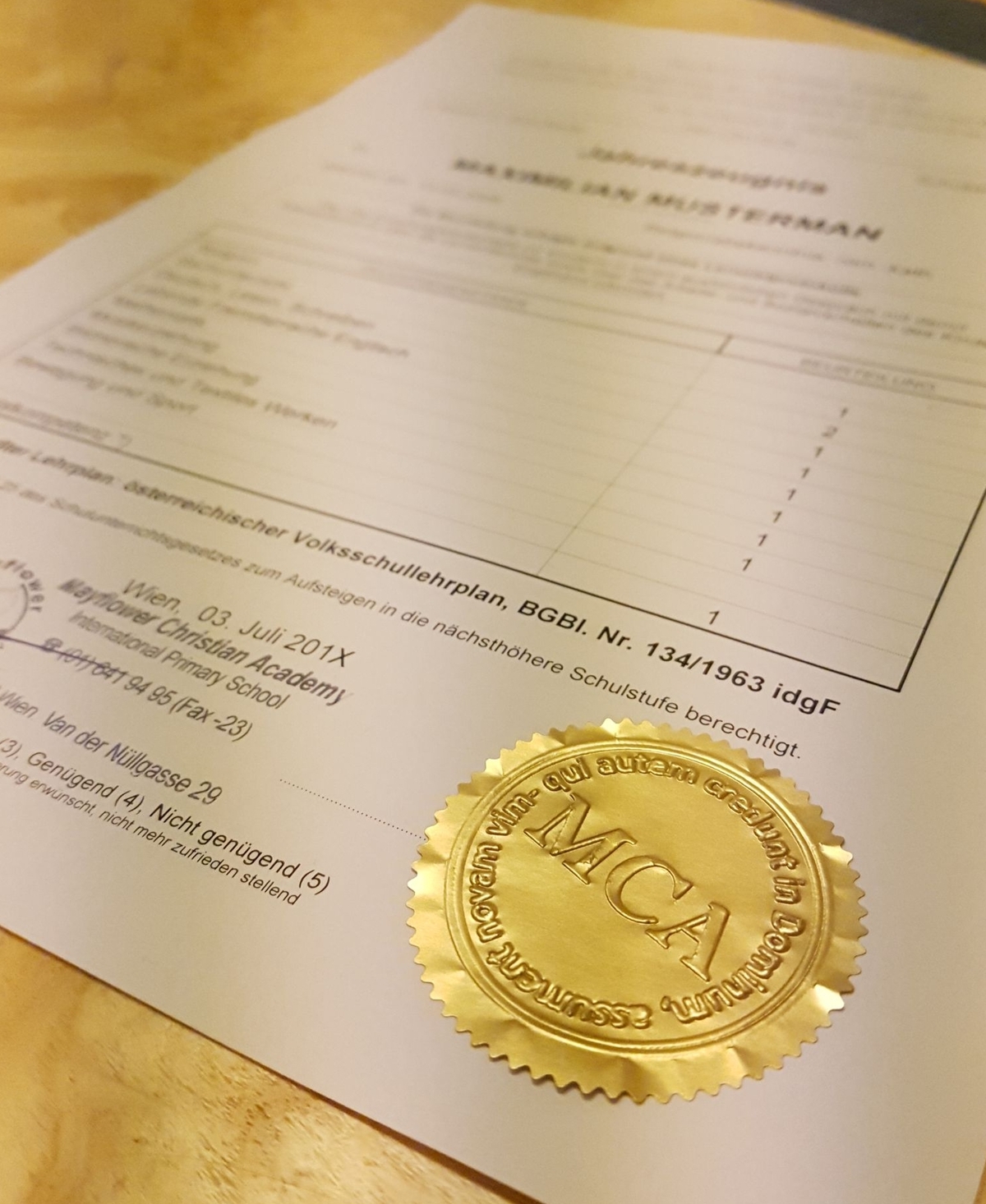Grading / Performance Assessment / Report Card
Teaching, learning and assessment are fundamentally interrelated and interdependent. The educational team assesses the student's work according to the school's agreed guidelines and standards.
At the beginning of the year, students and parents are informed (usually at the parents' evening in the first week of school) about the forms of performance assessment. Performance assessment in MCA goes beyond the traditional assessment of learning levels by including learning strategies, methodological skills and personal learning progress.
In MCA, children are graded in the annual report from the 3rd grade onwards according to the grading system commonly used in Austria (1, 2, 3, 4, 5), supplemented by a verbal addition. This assessment is supported by detailed learning objective protocols (LZP).
We see performance assessment as a tool to instil a work ethic in the children and to help them understand the principle of sowing and reaping.
It is important to us that the pupils understand at all times how their grades are arrived at. Furthermore, we support them in improving their grades. We want them to understand that the results in the learning objectives log or the grades are the reward for their work and not a product of chance. We see learning as a process and explain to the children that a lower grade simply signals that they are not yet ready in that area. However, it does not mean that a child has personally failed.
The assessment for the respective subjects is done by the pedagogical team, especially the responsible subject teachers. It is based on all the achievements in the semester in question. Personal performance development is also taken into account, i.e. greater weight is given to the most recent performance.
The assessment takes into account the achievement of the learning objectives, written and oral participation and the form of the work.
Learning objective:
Whether and to what extent the learning objective has been achieved.
Participation:
Active participation in class, punctual completion of work assignments and exercises, partner and team work.
Form of work:
Handling of materials, keeping exercise books and worksheets, accuracy, diligence.
Behaviour:
The behaviour of the pupils, their interaction with the other children and their behaviour towards the teachers is recorded in a separate behaviour grade (social competence).
The teachers' conference meets twice a year (1 week before the end of the semester) to discuss the performance assessment of the individual pupils.
Assessment levels
As the school reports are also considered as proof of completion of compulsory schooling and should enable comparability with the Austrian school system in terms of permeability, the grades are shown according to the Austrian assessment system according to §14 LBVO of the School Instruction Act (for more information please click on the link).

Assessment of behaviour at school
Behaviour at school is shown by comments in the school report. The extent to which personal behaviour and integration into the school community meet the requirements of the school rules is shown. During the admission procedure, the school rules (parent folder and student handbook) are brought to the attention of the parents or guardians. The assessment will take into account the child's aptitudes, age and efforts to behave properly.
Performance assessment (PE)
Among other things, the LF is used for the following purposes
- Continuous performance assessment of cooperation in class and in assigned work.
- Written tests on a limited range of subjects
- Written and oral examinations
Report cards and timely information to parents
Parents/guardians are informed of the status of their child's assessment by means of notifications (so-called report cards) on a parents' consultation day each semester and have the opportunity to talk personally with the teacher in individual discussions.
At the end of the school year, the pupil is to be issued with a notification of the performance status.
Assessment levels (grading) according to LBVO School Instruction Act (excerpt)
§ 14. (1) The following assessment levels (grades) exist for the assessment of pupils' performance:
Very good (1),
Good (2),
Satisfactory (3),
Satisfactory (4),
Not sufficient (5).
(2) The grade 'very good' is awarded for performance in which the pupil fulfils the requirements of the syllabus in the comprehension and application of the subject matter and in the execution of the tasks to a far greater extent than is essential and, where possible, demonstrates clear independence or the ability to apply his/her knowledge and skills independently to tasks which are new to him/her.
(3) The grade 'Good' is awarded for performance in which the pupil fulfils the requirements of the syllabus in the comprehension and application of the subject matter and in the execution of the tasks to an extent that goes beyond the essentials and, where possible, shows noticeable signs of independence or, with appropriate guidance, the ability to apply his/her knowledge and skills to tasks that are new to him/her.
(4) Satisfactory' is awarded to performance in which the pupil fully meets the requirements of the syllabus in the comprehension and application of the subject matter and in the performance of the tasks in the essential areas; deficiencies in performance are compensated for by noticeable approaches to independence.
(5) A grade of "Satisfactory" is awarded for performances in which the student predominantly fulfils the requirements of the curriculum in the comprehension and application of the subject matter as well as in the performance of the tasks in the essential areas.
(6) Performance with which the pupil does not even meet all the requirements for assessment with "sufficient" (Para. 5) shall be assessed as "not sufficient".
Duties of pupils
§ 43 (1) Pupils are obliged to contribute to the fulfilment of the task of the Austrian school (§ 2 of the School Organisation Act) through their cooperation and their integration into the community of the class and the school, and to promote the work of the lessons (§ 17). They shall regularly and punctually attend classes (and the care part at all-day school forms for which they are registered), bring the necessary teaching materials and comply with the school rules or the house rules.
Organisation of school life and quality assurance
§ 44 (2) The contract on admission to the public school (Article 5(6)) may contain provisions on the behaviour of pupils at school and at school events, on measures for the safety of pupils at school and at school events, and on enabling proper school operation, which deviate from or supplement the decree of the competent Federal Minister to be issued pursuant to subsection 1.
offenen
Tür





